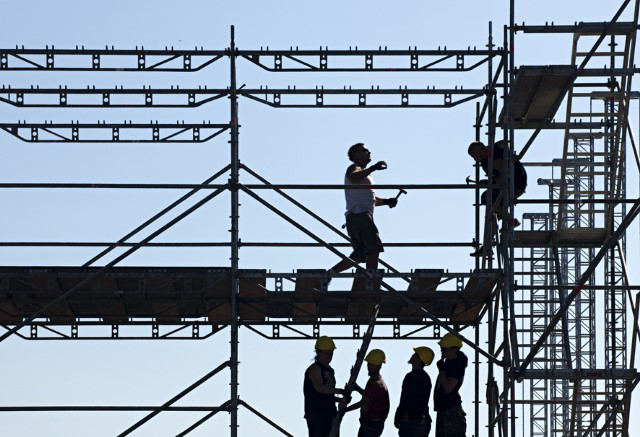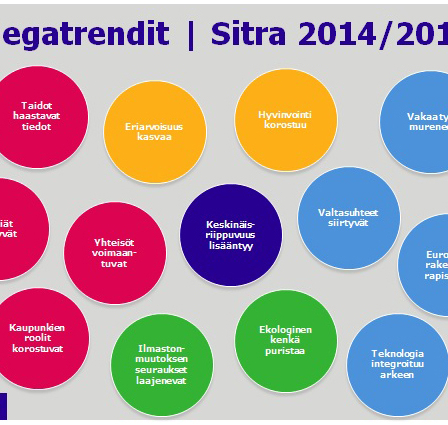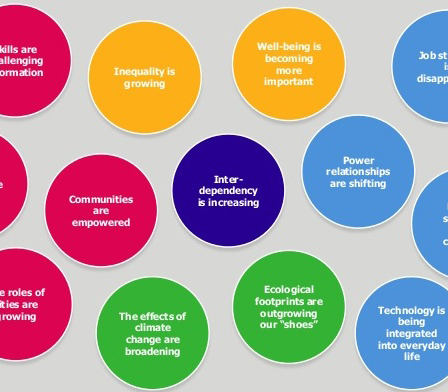This series of articles – Sitra Trends – reviews the trends listed by Sitra during October 2014, from a variety of perspectives.
In Europe, the post-war period was hugely successful in many respects. On a global scale, the way in which the war-ravaged continent maintained a steady course to become a union of peace, one of the world’s economic powerhouses and a promoter of liberal democracy and human rights is a story beyond comparison. However, the 2010s have been characterised by deep political and economic apathy. Why are supranational reforms so difficult to accomplish?
Sitra’s Leading Specialist on East Asia, Teppo Turkki, is in a sombre mood. He is observing developments in Asia from Taiwan, and Europe’s situation worries him.
“Asia’s development is not a story of competition with the West; it is following its own, separate growth narrative, which is nevertheless of huge relevance to Europe,” he says. “A large number of Asians have, or will, become part of the educated middle class. The talent implied in these numbers is staggering. Another key difference between Asia and Europe seems to be that Europe’s overall atmosphere is characterised by fear: of relative impoverishment, squalor issuing from economic decline and the ensuing unemployment, the collapse of the middle class and the unravelling of the welfare state. At the same time, the atmosphere in Asia is positive, marked by strong faith in the economy and the future, the energy to explore new things, the desire to become wealthy and the hunger to play a stronger role in globalisation.”
Of course, it would be easy to put Asia’s success down to its role as the underdog – it has nothing to lose and everything to gain. European countries, on the other hand, have a great deal to lose, and memories of former grandeur and prosperity remain powerful in many people’s minds. But the statistics do not lie. The economic growth rate in the EU is now just 0.3 per cent, and more than 24 million people are unemployed. In the autumn of 2014, the growth in Finland’s unemployment rate was the second highest among EU member states, topped only by Italy.
“The problem is even more extensive than this suggests: there is a crisis of democracy and failure of leadership in Europe,” according to Turkki. “Political leaders lack vision and the ability to implement reforms. During elections, they make populist but unrealistic political promises and reforms are torpedoed out of fear of how voters might react. Unless the Nordic welfare state model is renewed, we face utter bankruptcy.”
Or is there light at the end of the tunnel after all? During her long career, economist and long-term expert on the EU Sinikka Sokka has held positions on the boards of the Bank of Finland and the European Central Bank. Salo recognises the difficulties, but also states with conviction that she is an optimist when it comes to Europe.
“On a global scale, the European way of life is beyond compare. Human rights, freedom of speech, the rule of law; Europe is unsurpassed in these respects. I think that we are now waking up to the realisation that changes are needed if we want to maintain the existing European approach,” explains Salo.
Salo also says that we do not have to look far to identify things that we can do in order to help Europe move forward in leaps and bounds. In Salo’s opinion, what we need right now is concrete, collective action rather than more talk and petty nationalism.
“The first things on the to-do list are financial integration and the creation of a proper European federalist structure. The banking union, which is well underway, must be implemented in full. The European securities markets should also be integrated in order to boost the supply of venture capital to companies. Solidarity could be promoted through eurobonds, with the goal of securing funding for joint European projects. I think we should also be brave enough to establish a low-rate EU tax and buffer funds. As a result, the EU would once again be forced to pull together, which would breathe new life into it. This would also lead to better-functioning internal markets.
The methods listed by Sinikka Salo are pragmatic integration tools; however, they also serve a much higher purpose.
“Europeans need to understand that we can only be a strong competitor in the global arena if we stand united. So many things would function more effectively if they were done at EU level and member states would stop fixating on their own back yard. Finland is a prime example! With our population of five million, there is no way we could ever succeed alone in the face of global competition. Russia’s recent bullying tactics lend force to this idea. The more European we are, the more independent and free we will become. Russia is currently providing funding, for example, to Front National, a large anti-EU party in France. Sensing an opportunity to benefit from the fragmentation of Europe, Russia is helping to foster anti-EU forces.
Sinikka Salo refers repeatedly to the Founding Fathers of the EU. These include Robert Schuman, Konrad Adenauer and Valéry Giscard d’Estaing. Their legacy was later continued in the EU policies of leading figures such as Helmut Kohl and François Mitterand.
“After World War II, Europe was devastated, divided and bankrupt. But the Founding Fathers saw that our pragmatic, economic integration would provide a way of realising greater dreams, such as a lasting peace. This goal has been achieved. The next generation must dare to dream just as big; there is nothing to prevent dreams as great as world peace from becoming a reality! German unification is a good example of this. If they had listened to economists back then, the two Germanies would never have united. But political will and vision made it happen, Salo declares.
Towards a new Europe
What shape might such ambitious visions take and who will be the new political leaders that Europe so desperately needs?
Weak signals can be detected in countries that have already been forced to make changes. Spain is one of the countries in which reforms have been triggered by a painful economic collapse. The conservative and socialist parties that have been ruling since the 1970s are losing voters’ trust. Burdened by unemployment and debt, the middle class is now seriously questioning the legitimacy of the old ruling parties, which have been rocked by corruption scandals and refuse to renew themselves and open up to society.
Joan-Marc Simon, a political activist and economist from Barcelona specialising in the circular economy, explains these political stirrings.
“Spain’s educated middle class is exasperated with the paralysis shown by the ruling parties. New political movements are now demanding greater transparency in government activities and policies, and want to restrict MPs’ terms of office. The political system has become a prisoner of its own fears: politicians fear voters and avoid tough decisions. Limiting the term of office of MPs to one or two consecutive terms would solve at least one of the crises of democracy,” says Simon.
Sinikka Salo is concerned about the centralisation of political power. In her opinion, the personal interests of decision-makers and narrow, institutional vested interest are standing in the way of some reforms.
“I am extremely concerned about the spread of political appointments across the civil service. At least in Finland, the situation is beginning to look worse than in the 1970s! What we need right now is the best brains and talent being placed in charge of key public duties, regardless of party.
And what tools does Europe have for improving its economic performance amid intensifying global competition?
“Europe needs wiser use of resources rather than faster growth. European wealth–income ratios are the highest in the world and we have everything we could ever need. The pursuit of a good life, eco-efficiency and resource wisdom should take their place in Europe’s ruling ideology, alongside the rule of law, freedom of speech and human rights. We have every chance of achieving this if we are bold enough to grasp the nettle,” Joan-Marc Simon concludes.
When I outline Simon’s vision of the future and the opportunities for achieving a circular economy, Salo partly agrees, which is rather surprising since Finnish economists usually tend to have more traditional views on the sources of success.
“Since growth in Europe should not and cannot be placed on all fours with growth in emerging economies, we need to find completely new sources of prosperity and growth. The Finnish population is still highly educated and we have a great deal of expertise. A good example of reform for Finland would be Germany, another engineering country reliant on large-scale industry.
“In a relatively short period, the Germans have implemented the Energiewende, a comprehensive transition towards renewable energy. Of course the transition is costly at the moment, but in the long run it is a good investment which will generate plenty of innovation. Similarly, traditional industries have been reformed as service businesses, and the opportunities offered by modern communications technology and ICT have been harnessed in full. Finnish enterprises should seek greater co-operation with the Germans!”
In her speech at this year’s Ahtisaari Days (11-13 November 2014), Emma Bonino, Italy’s former Minister of Foreign Affairs, asked whether Europe could take its current anxieties about what it might lose and turn them around to say that we, in Europe, are the ones with most that is worth fighting for. Sinikka Salo continues this line of thought:
“My hopes are centred on moving forward. There is also some reality to this: we have been able to strengthen our integration despite the very short-sighted behaviour of various nation states. If we want our grandchildren to enjoy the same lives that we have grown accustomed to here in Europe, we need the courage to reinvent ourselves, pull together and deepen our integration. A few years ago, people who talked about European values such as freedom of speech, rule of law and human rights were labelled dreamers, but less so now. Perhaps global realities have brought about this change; we have unique freedoms, which I believe Europeans want to preserve.”
How? Salo’s face takes on a thoughtful expression.
“Perhaps now is the time to look back at our past. The Founding Fathers of the EU had great visions that they made into a reality. Now most of them are dead, while those who are still alive regret that their work was left unfinished. This may be the challenge facing the new generation; I hope that people come forward, fearlessly accept this challenge and leap ahead with it. I believe that the next 20 years will be crucial for Europe’s future with respect to discovering new political leadership and having the courage to radically change European states and institutions in response to today’s challenges. ‘Nothing is possible without men; nothing is lasting without institutions’,” Sinikka Salo concludes with a quote from Jean Monnet.
Related material:
Valery Giscard d’Estaing: La dernière chance de l’Europe
The opportunities of a circular economy for Finland (in Finnish)
How Universal Basic Income will save us from the robot uprising
A Vision for Finland: Towards Sustainable Well-being (in Finnish)





Recommended